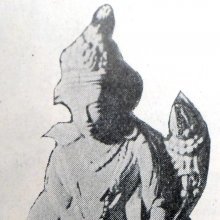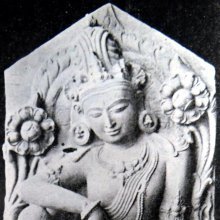Vishkambhin, Viṣkambhin, Vishkambhi, Viṣkambhī: 9 definitions
Introduction:
Vishkambhin means something in Buddhism, Pali, Hinduism, Sanskrit. If you want to know the exact meaning, history, etymology or English translation of this term then check out the descriptions on this page. Add your comment or reference to a book if you want to contribute to this summary article.
The Sanskrit terms Viṣkambhin and Viṣkambhī can be transliterated into English as Viskambhin or Vishkambhin or Viskambhi or Vishkambhi, using the IAST transliteration scheme (?).
Images (photo gallery)
In Buddhism
Tibetan Buddhism (Vajrayana or tantric Buddhism)
Source: archive.org: The Indian Buddhist IconographyViṣkambhin (विष्कम्भिन्) is another name for Sarvanivaraṇaviṣkambhin: a Bodhisattva commonly depicted in Buddhist Iconography, and mentioned in the 5th-century Sādhanamālā (a collection of sādhana texts that contain detailed instructions for rituals).—Sarvanivaraṇaviṣkambhin is also known by his shorter name of Viṣkambhin, and his statuettes occur at least four times in the Chinese collection. He is popular also in Tibet.
Viṣkambhin is described in the Sādhanamālā (Lokanātha-sādhana) as follows:—
Source: OSU Press: Cakrasamvara Samadhi“Viṣkambhin is of the colour of ash, and holds the excellent jewel and the Varada-mudrā in his two hands”.
Viṣkambhin (विष्कम्भिन्) is the name of a deity, according to the Guru Mandala Worship (maṇḍalārcana) ritual often performed in combination with the Cakrasaṃvara Samādhi, which refers to the primary pūjā and sādhanā practice of Newah Mahāyāna-Vajrayāna Buddhists in Nepal.—Accordingly, “Buddha, I give continual homage, highest Padmapāṇi, spirit of Maitreya (maitreyātmaka), Gaganagañja, Samantabhadra, the elevated friendly ruler of the Yakṣa, Mañjughoṣa, Viṣkambhin, Kṣitigarbha, I bow down before, Khagarbha”.

Tibetan Buddhism includes schools such as Nyingma, Kadampa, Kagyu and Gelug. Their primary canon of literature is divided in two broad categories: The Kangyur, which consists of Buddha’s words, and the Tengyur, which includes commentaries from various sources. Esotericism and tantra techniques (vajrayāna) are collected indepently.
Languages of India and abroad
Sanskrit dictionary
Source: DDSA: The practical Sanskrit-English dictionaryViṣkambhin (विष्कम्भिन्).—m. The bolt of a door.
Source: Cologne Digital Sanskrit Dictionaries: Edgerton Buddhist Hybrid Sanskrit DictionaryViṣkambhin (विष्कम्भिन्).—(compare viṣkambhayati 2), blocking, sup- pressing, (1) in Sarva-nīvaraṇa-viṣkambhin, q.v.; (2) Viṣkambhin, name of a Bodhisattva: Sādhanamālā 50.1.
Source: Cologne Digital Sanskrit Dictionaries: Shabda-Sagara Sanskrit-English DictionaryViṣkambhin (विष्कम्भिन्).—mfn. (-mbhī-mbhinī-mbhi) Obstructive, impeding. m. (-mbhī) The bolt or bar of a door. E. viṣkambha obstruction, and ini aff.
Source: Cologne Digital Sanskrit Dictionaries: Benfey Sanskrit-English DictionaryViṣkambhin (विष्कम्भिन्).—i. e. vi -skambh + in, I. adj. Obstructive, impeding. Ii. m. The bolt of a door.
Source: Cologne Digital Sanskrit Dictionaries: Monier-Williams Sanskrit-English Dictionary1) Viṣkambhin (विष्कम्भिन्):—[=vi-ṣkambhin] [from vi-ṣkambha > vi-ṣkambh] mfn. obstructing, impeding, [Horace H. Wilson]
2) [v.s. ...] m. the bolt or bar of a door, [ib.]
3) [v.s. ...] Name of Śiva, [Mahābhārata]
4) [v.s. ...] of a Bodhisattva, [Buddhist literature]
5) [v.s. ...] of a Tāntric deity, [Kālacakra]
Source: Cologne Digital Sanskrit Dictionaries: Yates Sanskrit-English DictionaryViṣkambhin (विष्कम्भिन्):—[vi-ṣkambhin] (mbhī-mbhinī-mbhi) 1. n. The bar of a door. a. Impeding.
[Sanskrit to German]
Sanskrit, also spelled संस्कृतम् (saṃskṛtam), is an ancient language of India commonly seen as the grandmother of the Indo-European language family (even English!). Closely allied with Prakrit and Pali, Sanskrit is more exhaustive in both grammar and terms and has the most extensive collection of literature in the world, greatly surpassing its sister-languages Greek and Latin.
See also (Relevant definitions)
Partial matches: Vi.
Ends with: Sarvanivaranavishkambhin, Sarvavaranavishkambhin.
Full-text: Sarvanivaranavishkambhin, Nivarana, Padmapani, Udyata, Maitreyatmaka, Parahitodyata, Parahita, Yakshadhipa, Mahasattva, Lokanatha.
Relevant text
Search found 2 books and stories containing Vishkambhin, Viṣkambhin, Vi-skambhin, Viskambhi, Vi-ṣkambhin, Vi-shkambhin, Vishkambhi, Viṣkambhī, Viskambhin; (plurals include: Vishkambhins, Viṣkambhins, skambhins, Viskambhis, ṣkambhins, shkambhins, Vishkambhis, Viṣkambhīs, Viskambhins). You can also click to the full overview containing English textual excerpts. Below are direct links for the most relevant articles:




